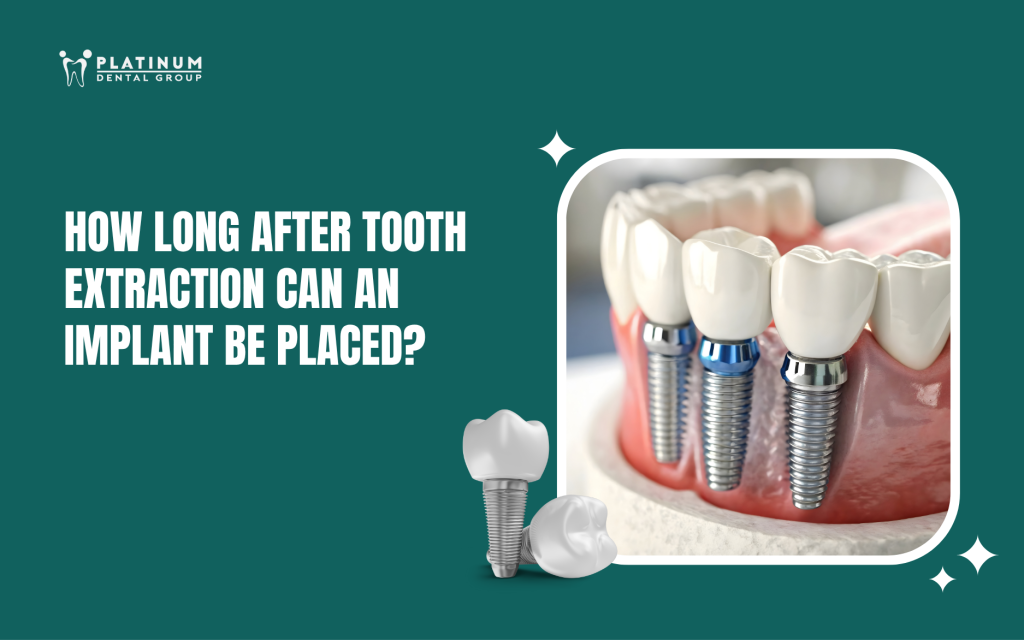Bleeding gums – causes, treatment, and when to see a dentist
Bleeding gums are more than just a minor inconvenience – they’re often an early warning sign that your gums are irritated, inflamed, or at risk of developing gum disease. Many patients first notice bleeding while brushing or flossing, but without timely care, this small symptom can progress into more serious oral health issues such as gingivitis or periodontitis.
At Platinum Dental Group, we believe that healthy gums are the foundation of a beautiful, lasting smile. Our experienced dentists combine gentle techniques, advanced technology, and personalized care to help patients treat bleeding gums effectively and restore full gum health.
In this article, we’ll explain what causes bleeding gums, how they’re treated, and when it’s time to see a dentist – so you can protect your smile and enjoy lasting comfort and confidence.
Nội dung bài viết
What are bleeding gums?
Bleeding gum is one of the most common signs that your gums may be irritated, inflamed, or developing early gum disease. It often appears when brushing or flossing, and while it might seem minor, it’s an important signal that your oral health needs attention.
Healthy gums should not bleed during daily hygiene. When bleeding occurs, it usually means bacteria and plaque have built up along the gum line, causing inflammation. Over time, this can progress from gingivitis (the mild, reversible stage) to periodontitis (a more advanced infection that affects the bone supporting your teeth).
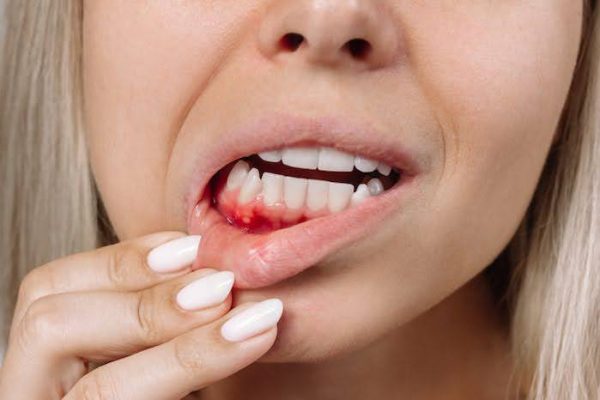
Common causes of bleeding gums
Bleeding gums can be caused by a variety of factors – from everyday habits to underlying health conditions. Understanding these causes helps patients take proactive steps toward maintaining strong, healthy gums and preventing more serious dental problems.
Here are the most common reasons why bleeding gums occur:
-
- Poor oral hygiene: Irregular brushing or flossing allows plaque to accumulate along the gum line. Over time, this sticky bacterial film irritates the gums, causing redness, swelling, and bleeding.
- Plaque and tartar buildup: When plaque hardens into tartar, it becomes a rough surface that traps bacteria and toxins. These irritants inflame the gums and make them more prone to bleeding – a condition that requires professional cleaning to resolve.
- Gum disease (gingivitis and periodontitis)
-
- Gingivitis – the earliest and most reversible stage of gum disease. Gums may appear red, swollen, and bleed easily when brushing.
- Periodontitis – a more advanced stage where infection spreads deeper, damaging the bone and connective tissues that support the teeth. Without timely treatment, this can lead to tooth mobility or loss.
- Vitamin deficiencies: A lack of essential vitamins – particularly vitamin C (for tissue repair) and vitamin K (for blood clotting) – can increase the risk of gum bleeding and delayed healing.
- Hormonal changes: During pregnancy, puberty, or menopause, hormonal fluctuations make gum tissues more sensitive and reactive to plaque buildup, leading to temporary inflammation and bleeding.
- Dental issues: Misaligned teeth, ill-fitting crowns or bridges, or chipped restorations can create areas where plaque easily accumulates and continuously irritates the gums.
- Medications: Certain drugs – such as blood thinners or medications for heart disease and high blood pressure – may affect the body’s natural clotting ability, making gums bleed more easily.
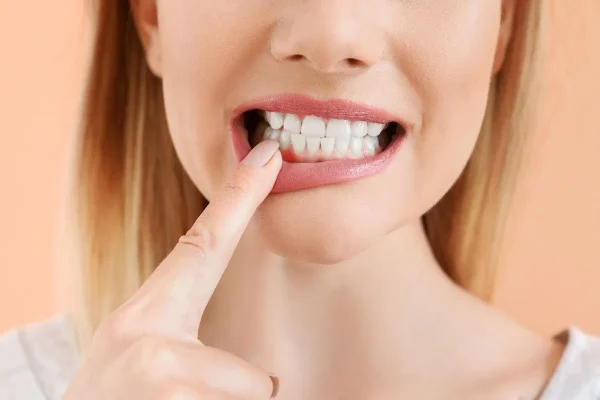
Signs and symptoms of bleeding gums
Recognizing the early signs and symptoms of bleeding gums is key to preventing serious gum disease. Many patients first notice a small amount of blood when brushing or flossing – but this should never be ignored. Healthy gums do not bleed under normal care.
Common symptoms that may accompany bleeding gums include:
- Red, swollen, or tender gums – a clear sign of inflammation caused by bacteria or plaque buildup.
- Bleeding when brushing or flossing – even gentle contact with a toothbrush or dental floss can trigger bleeding.
- Persistent bad breath or unpleasant taste – a result of bacterial infection around the gum line.
- Receding gums – gums begin to pull away from the teeth, making them appear “longer.”
- Increased tooth sensitivity – due to exposed tooth roots or gum recession.
- Loose teeth or shifting bite – an indication that infection may be affecting the bone and connective tissue supporting your teeth.
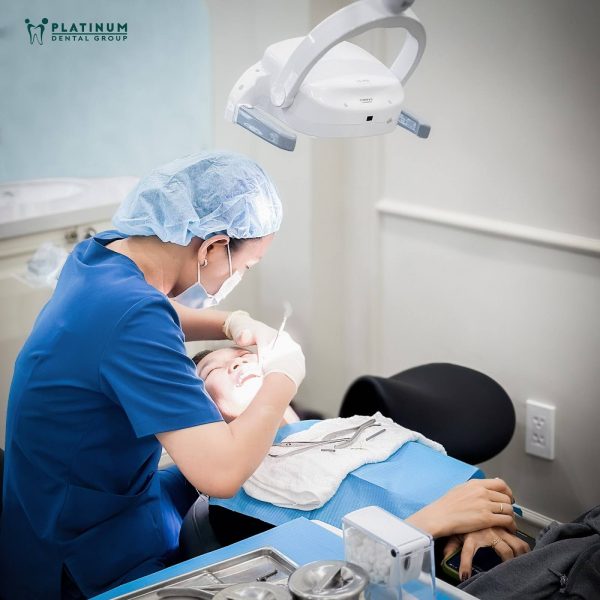
Treatment options for bleeding gums at the dentist
Professional dental treatment is the most effective way to stop bleeding gums and restore long-term gum health. At Platinum Dental Group, our dentists provide gentle, evidence-based procedures that remove bacteria, reduce inflammation, and promote healthy tissue regeneration – all while ensuring patient comfort and safety.
Here are the main treatment options recommended for patients with bleeding gums:
Professional dental cleaning (scaling & polishing)
This is the first and most essential step in treating gum problems. Our hygienists carefully remove plaque and tartar from above and below the gum line, helping to eliminate the bacteria responsible for irritation and bleeding. The polishing process then smooths tooth surfaces, making it harder for new plaque to accumulate.
Root planing and deep cleaning
When gums are more severely affected, this treatment smooths the root surfaces of teeth, allowing gums to reattach properly and reducing bacterial growth in deep pockets. It’s a highly effective method for reversing early signs of periodontitis and preventing further bone damage.
Advanced biofilm removal using AIRFLOW technology
Platinum Dental Group proudly features this Swiss-made technology, which uses a precise combination of air, water, and fine powder to gently remove biofilm, stains, and bacteria – even beneath the gums.
- Safe and comfortable for patients with gum inflammation, periodontitis, dental Implants, or bridges.
- Effectively reduces bleeding, inflammation, and bad breath.
- Particularly beneficial before or after aesthetic restorations like Porcelain Veneers or Crowns, ensuring optimal gum health and beautiful results.
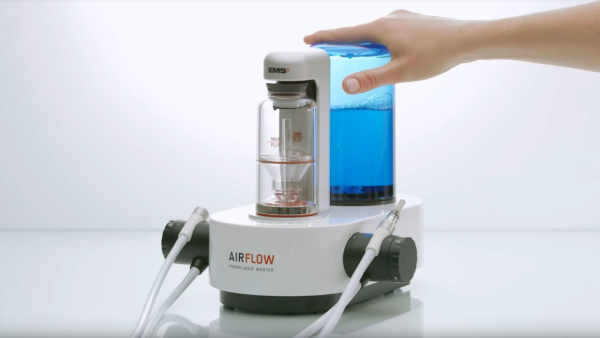
Laser or advanced gum therapy
Depending on the severity of your condition, our clinic may recommend laser-assisted gum treatment to precisely remove infected tissue, disinfect the area, and stimulate faster healing with minimal discomfort or downtime.
Gum therapy and maintenance
Healthy gums require ongoing care. Platinum Dental offers personalized maintenance sessions to monitor your progress, reinforce proper oral hygiene, and keep your gums stable long after treatment.
At Platinum Dental Group, every procedure is performed by experienced dentists using state-of-the-art equipment under international sterilization and safety standards. From gentle scaling to advanced laser therapy, our focus is to make each visit comfortable and effective – helping you achieve healthier gums and a confident, lasting smile.

Home care tips to prevent bleeding gums
Healthy gums start with consistent daily care. While professional dental treatment is essential to manage bleeding gums, maintaining proper oral hygiene at home plays a major role in preventing recurrence and supporting long-term gum health.
Here are simple yet effective tips recommended by Platinum Dental Group dentists:
- Brush properly twice a day
Use a soft-bristled toothbrush and gentle, circular motions to clean along the gum line without causing irritation. Replace your toothbrush every 3–4 months or sooner if the bristles fray. - Floss daily
Flossing removes plaque and food particles that brushing alone can’t reach. Be gentle when guiding the floss between teeth to avoid injuring the gums. - Use an antibacterial mouthwash
Rinsing with a dentist-approved mouthwash helps reduce bacteria, inflammation, and bad breath – supporting healthier gums between cleanings. - Maintain a balanced diet
Eat foods rich in vitamin C, vitamin K, and calcium, which strengthen gum tissue and support healing. Limit sugary snacks and acidic drinks that feed harmful bacteria. - Stay hydrated
Drinking enough water throughout the day helps wash away debris, neutralize acids, and keep your mouth naturally clean. - Avoid smoking and alcohol
Tobacco and excessive alcohol slow healing and increase the risk of gum disease, tooth loss, and oral infections. - Schedule regular dental checkups
Visit Platinum Dental Group every 6 months (or as advised) for professional cleaning and early detection of any gum or tooth issues.
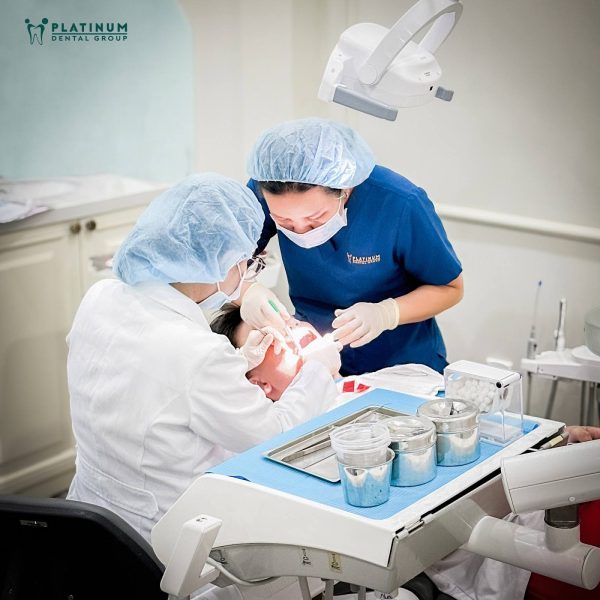
When to see a dentist immediately
Occasional gum bleeding may not seem serious, but persistent or severe symptoms can indicate an underlying dental or health problem that needs professional attention. You should see a dentist immediately if you notice any of the following:

- Bleeding that occurs frequently or does not stop easily
- Swollen, red, or painful gums
- Pus or discharge around the teeth and gums
- Persistent bad breath or unpleasant taste despite regular brushing
- Loose teeth, gum recession, or changes in your bite alignment
- Bleeding after dental restorations such as Implants, Crowns, or Porcelain Veneers
- General fatigue or other systemic symptoms that accompany gum bleeding
At Platinum Dental Group, our experienced dentists perform a thorough evaluation – including digital X-rays, periodontal assessment, and 3D imaging – to identify the cause and recommend the safest, most comfortable treatment plan. Early diagnosis not only protects your gums but also helps preserve your overall oral health.
FAQ about bleeding gums
How do you fix bleeding gums?
Treatment depends on the cause. In most cases, professional scaling, deep cleaning, or AIRFLOW therapy at Platinum Dental can remove plaque and bacteria that cause irritation. Combined with improved home care and regular checkups, gum health can be fully restored.
Is it OK to brush bleeding gums?
Yes – but do so gently. Bleeding gums are often caused by plaque buildup, so stopping brushing can make the problem worse. Use a soft-bristled toothbrush, clean carefully along the gum line, and visit your dentist for a professional cleaning.
What causes bleeding gums?
Common causes include poor oral hygiene, plaque and tartar buildup, gum disease (gingivitis or periodontitis), vitamin deficiencies, hormonal changes, and certain medications such as blood thinners.
Are bleeding gums always a sign of gum disease?
Not always. While gum disease is a leading cause, bleeding can also result from brushing too hard, vitamin deficiencies, hormonal changes, or ill-fitting dental restorations. A professional assessment is the best way to determine the exact reason.
Why do my gums bleed when I brush my teeth?
This usually happens due to plaque accumulation or improper brushing technique. If the problem persists for more than a few days, it may indicate early gum inflammation and should be checked by your dentist.
Restore your gum health with Platinum Dental Group
Bleeding gums are not something to ignore – they are an early warning sign that your gums need professional care. At Platinum Dental Group, our dedicated team combines gentle techniques, advanced technology, and personalized care to help every patient regain healthy gums and a confident smile.
Whether you need a professional cleaning, deep gum therapy, or long-term maintenance, our clinics are equipped to deliver safe, effective, and comfortable treatment for patients of all ages.
Book your consultation today and take the first step toward healthier gums and long-lasting oral wellness.
A Trusted Dental Destination – Platinum Dental Group
Learn more:
- Overview information on Dentist Implant services
- What is Dental Veneer? Types of Dental Veneers available at Platinum Dental Group
- Dental Implants Cost at Platinum Dental Group
- What is cosmetic dental crown? Advantages of cosmetic dental crowns
- Essential details related to all on four Dental Implants
- Overview of full mouth Dental Implants
Platinum Dental Group
Clinic Locations:
📍Platinum Dental Central: 127 Nguyen Cu Trinh Street, Cau Ong Lanh Ward, Ho Chi Minh City
📍Platinum Dental Thao Dien: 1H Street 10, An Khanh Ward, Ho Chi Minh City
📞 Hotline: (+84) 28 3920 9969 | 096 779 7799
✉️ Email: info@platinumdentalvietnam.com
🌐 Website: https://platinumdentalvietnam.com/
💬 Instagram: https://www.instagram.com/platinumdental.vietnam/
🔗 Facebook: https://www.facebook.com/platinumdentalvn



 Tiếng Việt
Tiếng Việt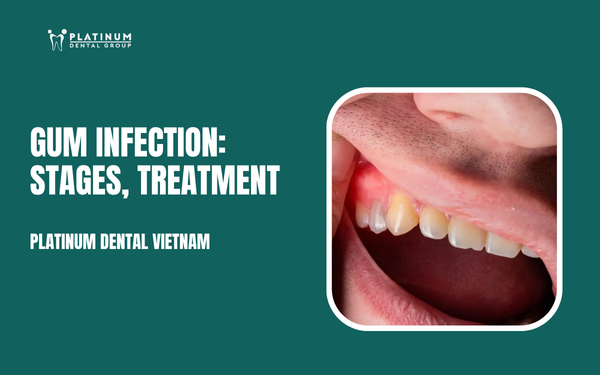
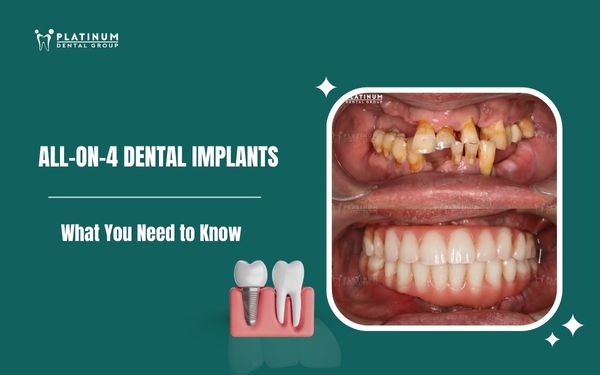
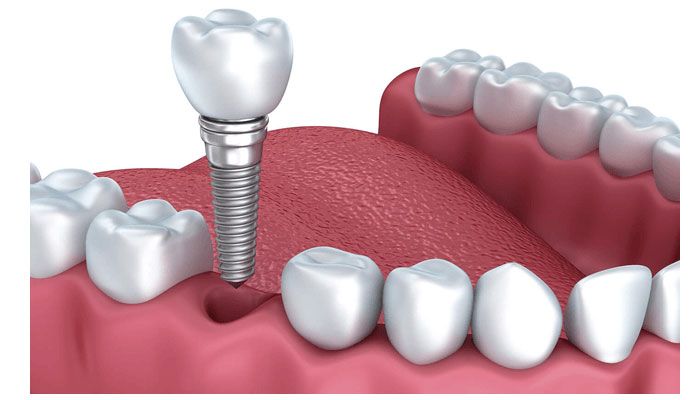

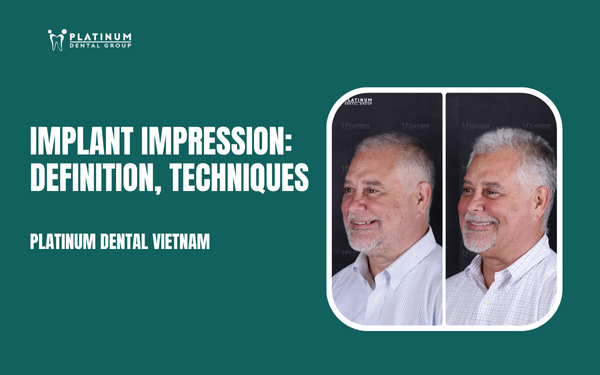
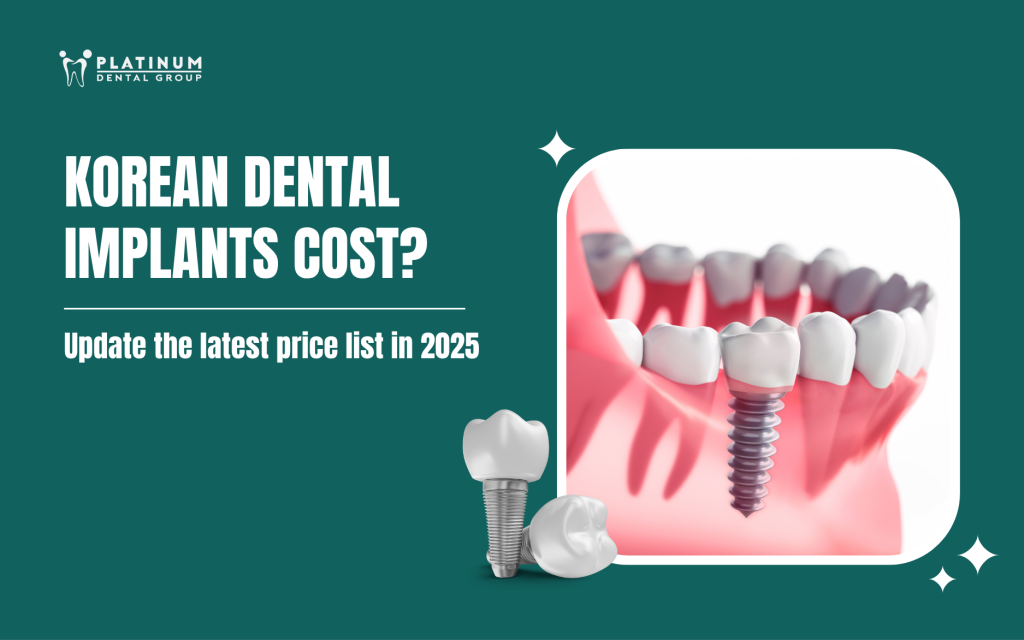




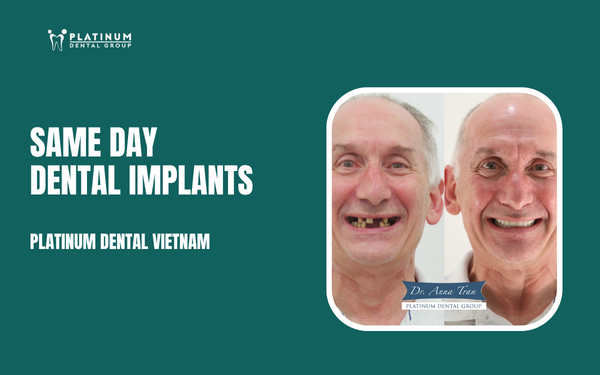
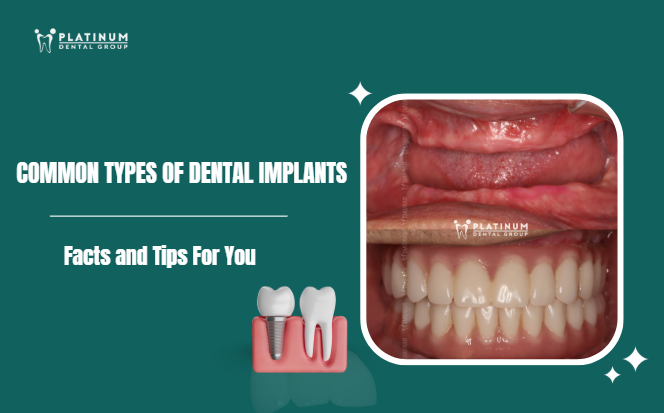
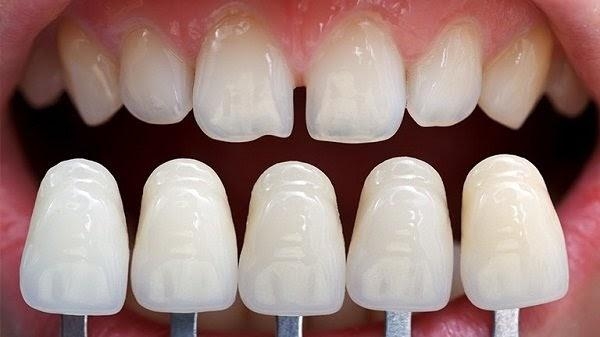
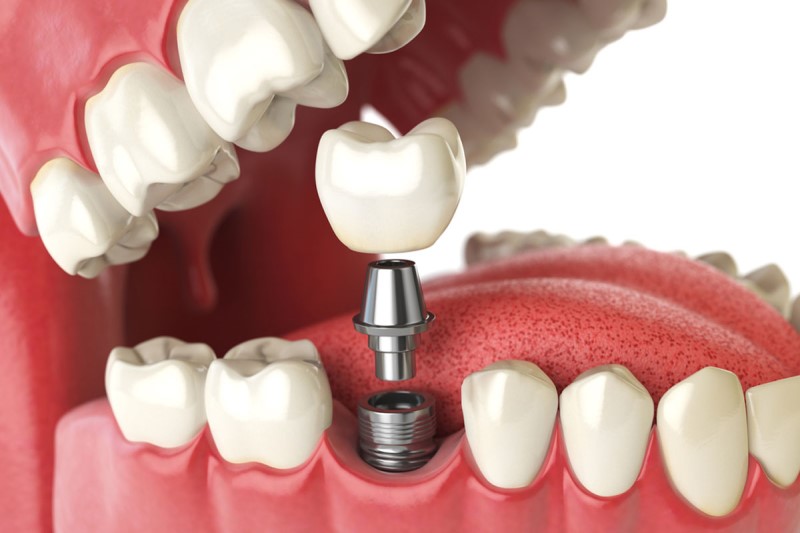

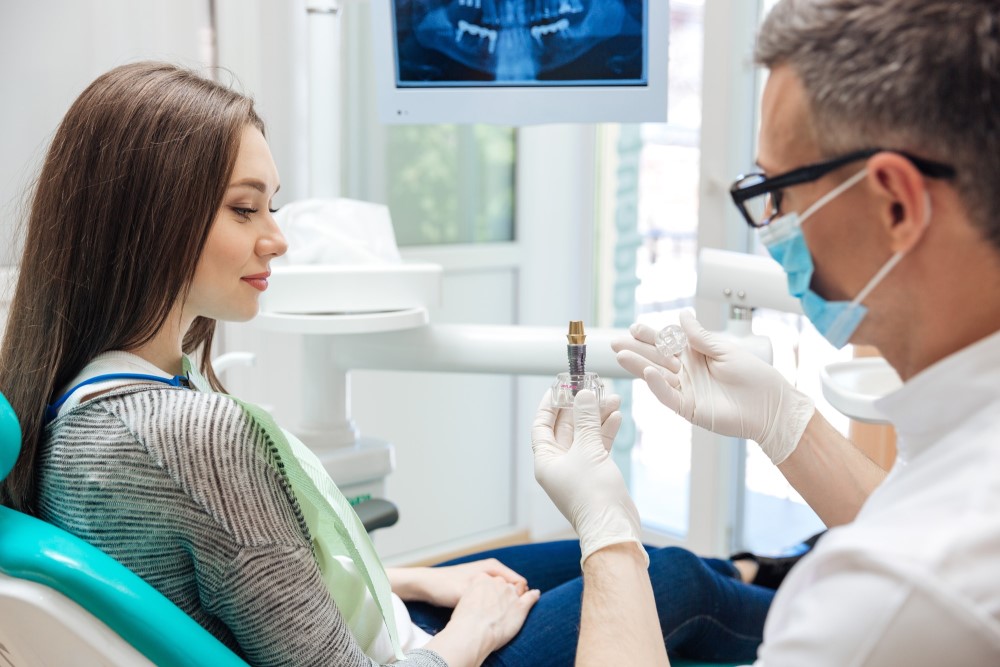


![[Updated 2025] How long does the dental implant process take? Influencing factors 26 how long does the dental implant process take](https://platinumdentalvietnam.com/wp-content/uploads/2025/11/how-long-does-the-dental-implant-process-take-4.jpg)
